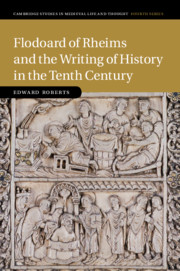Book contents
- Flodoard of Rheims and the Writing of History in the Tenth Century
- Cambridge Studies in Medieval Life and Thought
- Flodoard of Rheims and the Writing of History in the Tenth Century
- Copyright page
- Dedication
- Contents
- Tables
- Acknowledgements
- Abbreviations
- Introduction
- Chapter 1 Flodoard, His Archbishops and the Struggle for Rheims
- Chapter 2 Narrative and History in the Annals
- Chapter 3 Institutional History and Ecclesiastical Property
- Chapter 4 History, Poetry and Intellectual Life
- Chapter 5 Flodoard’s Age of Miracles
- Conclusion
- Bibliography
- Index
Chapter 3 - Institutional History and Ecclesiastical Property
Published online by Cambridge University Press: 05 September 2019
- Flodoard of Rheims and the Writing of History in the Tenth Century
- Cambridge Studies in Medieval Life and Thought
- Flodoard of Rheims and the Writing of History in the Tenth Century
- Copyright page
- Dedication
- Contents
- Tables
- Acknowledgements
- Abbreviations
- Introduction
- Chapter 1 Flodoard, His Archbishops and the Struggle for Rheims
- Chapter 2 Narrative and History in the Annals
- Chapter 3 Institutional History and Ecclesiastical Property
- Chapter 4 History, Poetry and Intellectual Life
- Chapter 5 Flodoard’s Age of Miracles
- Conclusion
- Bibliography
- Index
Summary
In the History of the Church of Rheims, Flodoard devotes significant attention to describing the acquisition and defence of property by the bishops of Rheims. Flodoard’s emphasis on church property has often been thought to be a generic, unremarkable aspect of ‘institutional’ historiography. This chapter argues that Flodoard’s focus on Rheims’s property was far more targeted, and that he sought to justify his church’s claims to specific lands in response to the schism that wracked the archbishopric in the first half of the tenth century. After surveying the evidence for property management in early medieval Rheims, I examine Flodoard’s techniques as an archivist and his activities as an administrator involved in land disputes. Claims were constructed on the basis of written texts (sometimes forged), local tradition and recent history. This chapter also considers the question of genre as it pertains to such works of institutional or local history as well as the implications of its findings for the audience and function of the History.
Keywords
- Type
- Chapter
- Information
- Publisher: Cambridge University PressPrint publication year: 2019



